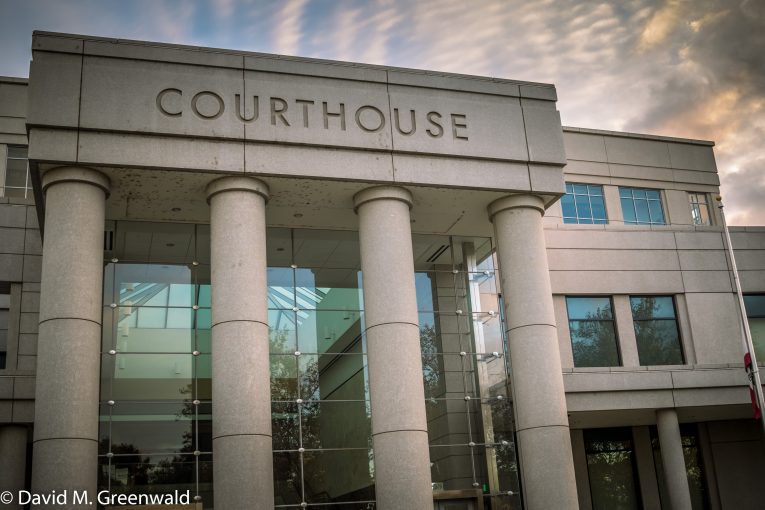
 By Danielle Eden C. Silva
By Danielle Eden C. Silva
Closing statements were delivered in Department 11 for the trial of Guillermo Jose Villegas, charged with driving and receiving a stolen vehicle. Prior to the entry of the jury, the prosecution requested the closing statements be put off to explore more evidence.
The prosecution argued evidence concerning cell phone location had not been delivered until early yesterday and he would like to present it to the jury today. This evidence, he said, shows the location of the car through global positioning system coordinates. These coordinates could be translated via a website.
The defense argued that the evidence should not be valid as the reliability of the site couldn’t be testified to by the officer who used it. In fact, the location the phone provides fits within a triangulated area, not a specific point. In contrast, the prosecution argued that the information would still be valid because the officer had been to the locations in person.
The court said that, because the arresting officer could not provide specific, well-versed information on the phone locator, this motion was denied.
The court went over jury instructions with the defense and prosecution before bringing in the jury.
In jury instructions, the court explained Mr. Villegas was accused of unauthorized use of a vehicle and receiving a stolen vehicle. Under the first charge, the jury must decide whether the defendant drove the vehicle without consent and that there was intent to deprive the owner of possession. The second charge would require the defendant to have known the vehicle was stolen upon reception.
These elements would be required in the jury’s final decision. The closing arguments began with the prosecution. The prosecution began with a PowerPoint, listing the laws and the elements upon
which the defendant is being charged. The prosecutor walked through each step, noting that Mr. Villegas had been found driving the stolen vehicle and the owner of the vehicle did not even know Mr. Villegas. If the owner did not know Villegas, there was no method by which to give consent. Additionally, no attempt had been made on Villegas’ part to return the vehicle.
The prosecution argued Mr. Villegas must have known the car was stolen, as evidence was shown through his text messages. The defendant had asked a friend for money and had been driving the car around. Pictures had also been sent of golf clubs and weed that had been found in the car, which he was purposefully trying to sell.
The defendant’s behavior and rationale also came off as unusual. He claimed he had taken a bus to Cache Creek Casino and received keys to the stolen vehicle there through a woman named “Samantha.” This story must be fabricated, the prosecution stated, and therefore Mr. Villegas knew the car was stolen. In accordance with determining how expensive the car was, the prosecutor reminded the court what the owner had testified to. Since the condition had stayed the same the entire time he had owned it, the owner had estimated the stolen vehicle’s amount to still be $13, 800. The prosecution requested that the jury consider the defendant guilty on both counts.
The defense’s closing began with a quote from the text messages. “Once again [the defendant’s friend] with a save.” While not called up as a witness, the defendant’s friend had been an important factor in the investigation, claimed the defense. Mr. Villegas, the defense stated, relied very much on his friend: getting from him money to stay at a motel, borrowing a car, and using his home as a place to park his bike since he was between homes. Because this friend had often come “with a save,” Mr. Villegas did not want to mention his friend.
The defense went through step by step on how the car was stolen on November 6, and on November 7 the friend texted the defendant to learn his location. The defendant didn’t respond until late that night. The defense noted the defendant’s friend was not necessarily a good influence, having been a man with prior crimes on his record. Mr. Villegas just had plans with a date, a date that required a vehicle, which was being supplied by his friend – who would eventually throw him under the bus when questioned by an officer.
Additionally, the defense reminded the jury the presumption of innocence is what came first – the prosecution’s claims were all circumstantial evidence. In the defendant’s right to the presumption of innocence, it is on the prosecution to prove that the defendant is guilty through proof. However, there was no evidence saying that Mr. Villegas didn’t go to Cache Creek. The defense concluded by asking to find the defendant not guilty on both counts. The prosecution, in rebuttal, asked why the defendant would cover for his friend if he didn’t know the car was stolen. The defendant must have known that the car was stolen and didn’t want the police to know. Additionally, circumstantial evidence does not make evidence less valid.
The jury was given further instructions and then was sent to deliberate.
